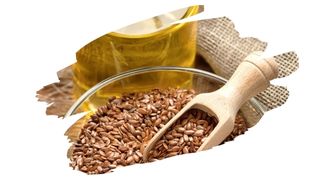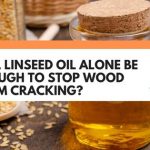Wood rot starts with the growth of mold. And if this problem is left unchecked, then wood can quickly decay.
This is one of many reasons why coating wood with a wood sealant is so important.
A waterproofing sealer will prevent wood from absorbing water, keeping it too dry for mold bacteria to grow in.
But when it comes to waterproofing wood, is linseed oil alone going to be enough to prevent mold growth?
Well, in this post, you’ll find out why wood can become moldy — and the best way to prevent mold growth on outdoor decking. You’ll also discover what makes Linseed oil a microporous finish — and how it impacts this oil finish’s ability to protect wood from water damage.
And keep reading to learn which easy-to-apply wood sealer is best at weatherproofing exterior wood.

This post may contain affiliate links to products that we receive a commission for (at no additional cost to you). Learn more here.
So How Do You Actually Prevent Mold From Growing On Wood?
Mold bacteria like to live in damp environments, and they love to feed off decaying plant life.
And when water manages to soak into natural solid timber, it turns that wood into the perfect home for bacteria. So, if you want to stop mold, you need to prevent water from soaking into wood.
Pretty straightforward, right? Not quite. You see, waterproofing wood all comes down to the kind of wood sealant you use.
Is Linseed Oil Good For Sealing Wood And Waterproofing It’s Surface?
Here’s the thing; Linseed oil is not waterproof. At best, it is a wonderfully water-repellent finish that can make aged wood look great.
But Linseed oil cures into a microporous finish, which means that this finish only stops water droplets from sinking past its film. Yet, Linseed oil won’t stop condensation or steam from making its way past its solid resin coat.
So, Linseed oil is far from great at wholly protecting wood from water damage.
What Do You Mean By A Microporous Finish? Microporous finishes are water-resistant (i.e. they can stop water droplets). However, they are not waterproof — and they won’t stop water vapor such as steam or humid condensation. If you were to place a hot cup of tea on a microporous finish, the heat plus condensation will get past it.
OK. But Is Linseed Oil Somewhat Mold Resistant?
Nope, not at all. Raw Linseed oil does not contain any antibacterial additives, so it won’t be able to help fight off mold.
What’s more, Raw Linseed oil in particular can actually encourage the growth of mold.
Wait A Minute…Does Linseed Oil Really Promote Mold Growth?
Well, it does, but in a roundabout way.
Linseed oil is made by crushing flaxseed. So, this food-sourced oil contains food proteins. And mold bacteria love to feed on those proteins.
This isn’t a problem once Linseed oil has cured into its hard resinous form. But, while this oil is still drying/curing, it is a big problem.
You see, Raw Linseed oil takes ages to cure — up to 10 weeks in some cases. And that gives plenty of time for bacteria to grow on the surface of this finish.
Related Post: How To Make Linseed Oil Dry Faster (What You Need To Know)
Still, you can avoid slow-drying Raw Linseed oil, and opt for its fast-drying alternative. Boiled Linseed oil (BLO) blends linseed oil with solvents and other chemical additives. And this blend allows BLO to dry and cure in a fraction of the time of Raw Linseed oil.
So, because BLO cures so quickly, any flaxseed-hungry bacteria never get a chance to grow atop this finish.
But, Linseed oil, whether it be Raw or Boiled, is a microporous finish either way. So neither Linseed oil version is going to be enough to waterproof wood.
Related Post: Boiled Linseed Oil vs Thompson’s Water Seal: Which One Is Better For Wood?
So That’s Linseed Oil Crossed Off The List…What Can I Use To Waterproof Wood Instead?
Use a urethane-based wood finish — preferably ones that also contain antibacterial additives. And when it comes to exterior decking, your best option is to use a penetrating Spar Urethane sealer.
Sometimes referred to as Yacht Varnish, this wood sealer offers superb waterproofing. Which is why it is used on boat decking and the like.
It is also very easy to maintain, as it only needs to be reapplied once every five years or so.
But, best of all, it contains mildew-resistant additives, and it’s UV-resistant too. So, it can provide all-round weatherproofing for outdoor timber.
You can find out more about Spar Urethane sealers by checking out our post: Can You Use Polyurethane On Tree Bark Decorations?
To Wrap Up, Here Are The 3 Key Takeaways From This Post…
- 1). Linseed oil doesn’t prevent mold growth. And, in the case of Raw Linseed oil, it can even encourage mold growth.
- 2). Linseed oil takes a long time to dry, and even longer to cure. In fact, it takes so long to dry, that mold can begin to grow on this finish.
- 3). If you want a complete waterproof and weatherproof sealer for outdoor decking, then use Spar Urethane instead.



